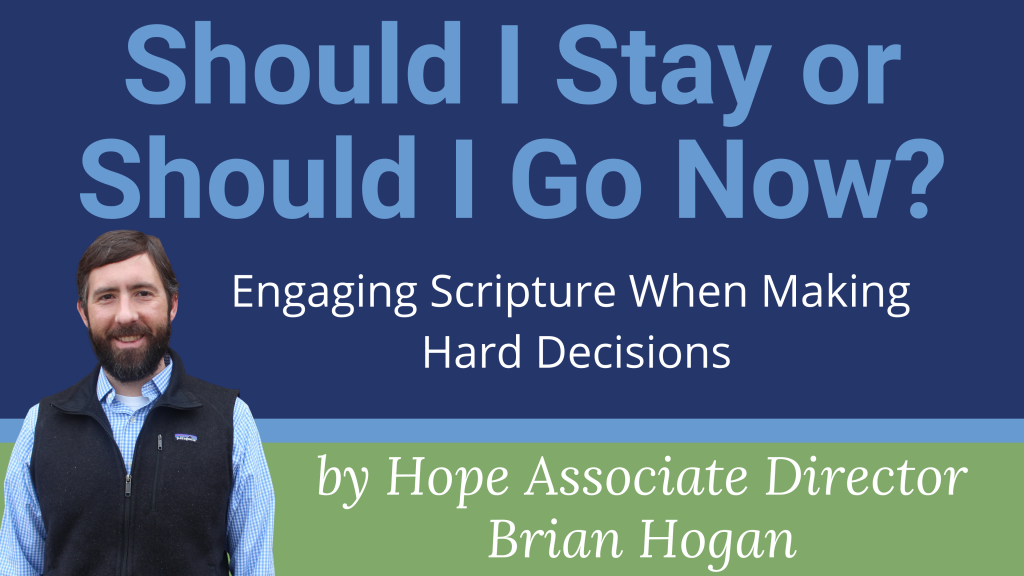My wife and I both have difficulty making decisions–moving from thought to action. We think about making decisions. We talk about making decisions. But we find it hard to pull the trigger on decisions. What often makes us finally make a decision is when we become pressed up against time. So when it came to making a recent large time-sensitive life decision that would have a huge impact on our family (the hardest kind of decision to make), we knew that we could not wait forever to make the decision. But how do we make the decision? What categories do I use to make the decision? How much do I let my feelings guide my decisions? What if I make the wrong decision? Is there a wrong decision? Is this the will of God for my life? And down the spiral of doubting and second-guessing we go.
second-guessing we go.
The decision my wife and I recently faced was whether or not to move our family across the country for a new job—a job that we had only dared to dream about. But the move would come at a great cost. We would be moving away from my wife’s hometown. Her parents, aunts and uncles, cousins, and high school friends all live there. It is the only home that our kids have known. They love their school. They love their neighbors. They love their life.
How do we make this decision? Would we—could we—feel peace about such a decision? Either we choose the opportunity, move, and move forward professionally or we choose to stay where it is comfortable, where we are known and have the support of family. Both options offer good things. Both options require sacrifice. How do we make this decision?
As my wife and I had conversations—with each other and other people—we did our research, and we prayed, my mind went to the story of Abraham. The story of Abraham in Genesis provides us four observations about making decisions.
-
The call of the Lord seldom comes with a map. When we look at Genesis 12:1, God simply tells Abraham to get up, leave your home, and go to the land I will show you. There was some ambiguity with the details. Abraham is not given a concrete direction. He was merely called to be obedient and God would show him where.
-
Following the Lord does not always mean that circumstances will remain in our favor. In the matter of three verses, Abraham’s lot was turned upside down. In verse 7 of Genesis 12, God shows Abraham the land He will give to him and his offspring. Then in verse 10, Abraham and his family go to Egypt because there is suffering in the land. Though Abraham’s situation has changed, it does not mean that he has lost favor with the Lord or that he was in disobedience. Rather, it reveals that Abraham lived in a broken, fallen world. His experience of suffering did not make God’s promise any less true.
-
Abraham was not perfect in following the Lord. On several occasions, he took matters into his own hands rather than trusting in the Lord. Not once but twice Abraham gave up his wife to more powerful men in order that he might preserve their (his) life (Gen. 12:10-20, Gen. 20). He slept with his wife’s servant in order to produce an offspring (Gen. 16). Even as God demonstrated his faithfulness, Abraham struggled to trust God.
-
God kept his promise. In spite of Abraham’s repeated lack of trust and subsequent disobedient actions, God remained faithful to Abraham (Gen. 15, Gen. 17:15-27, Gen. 21:1-7). From the beginning until the end of Abraham’s story, we see that God was with Abraham. The story is less about the perfection of Abraham’s story and more about the faithfulness of God to walk with his people and to not forsake them.
Abraham’s story brings comfort as my wife and I rest in the decision we made. We were presented an opportunity. It is a good opportunity and an opportunity we believe the Lord has provided for us. At the same time, it is a risk. We don’t know all the details of moving to a new state. We aren’t promised that our experience won’t be challenging and hard. And we know that we will make mistakes and sin against one another. But all this doesn’t mean that we have fallen out of favor with the Lord or made the wrong decision. We know that the Lord is faithful—not because of the quality of my faith but because of the quality of his faith. And he promises us that he is with us to the end of the age and will not allow the waters to overtake nor the fires to consume because we are his.

 second-guessing we go.
second-guessing we go.